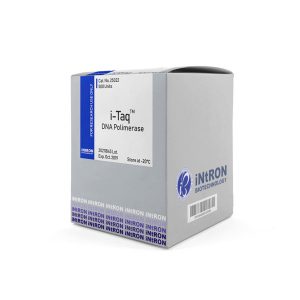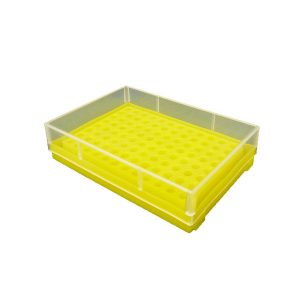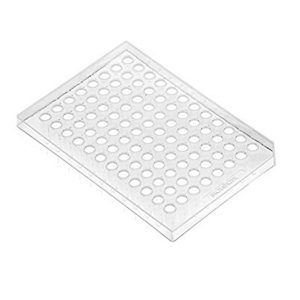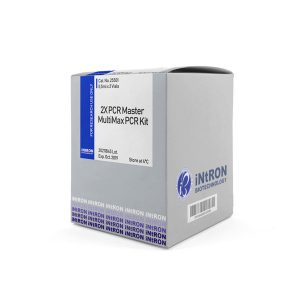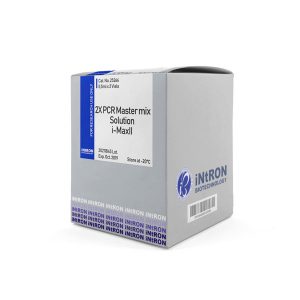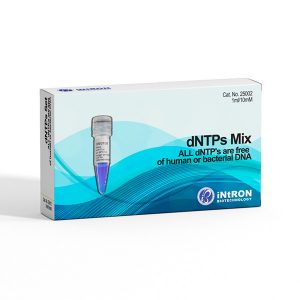Taq Polimerasa con dNTP´s
Taq Polimerasa is High-purity i-Taq™ PCR core kit that displays stable and efficient DNA amplification regardless of template type and reaction conditions
- 94 KDa thermostable DNA polymerase
- High purity Taq DNA Polymerase
– Removal of E. coli -derived proteins and DNA that may act as PCR sources - Applicable to DNA from cloned DNA to human genomic DNA
- Buffer optimization to show the best polymerase activity regardless of template type or reaction conditions
- Presentación: Vial 500 Units / 5U/ul
- Código: 25022

65,00€
-
PCR/Real Time, Polimerasas
Taq Polimerasa con dNTP´s
Taq Polimerasa is High-purity i-Taq™ PCR core kit that displays stable and efficient DNA amplification regardless of template type and reaction conditions
- 94 KDa thermostable DNA polymerase
- High purity Taq DNA Polymerase
– Removal of E. coli -derived proteins and DNA that may act as PCR sources - Applicable to DNA from cloned DNA to human genomic DNA
- Buffer optimization to show the best polymerase activity regardless of template type or reaction conditions
- Presentación: Vial 500 Units / 5U/ul
- Código: 25022
 SKU: 25022
SKU: 25022 -
-
FUNGIBLE, PCR
Placa de PCR 0,2ml Media Faldilla
- Made of high quality medical grade polypropylene
- Ultra-thin tube walls with uniform thickness for accelerated heat transfer,shortercycletimes, and more consistent results
- Alphanumeric well labeling for convenient identification
- DNase, RNase, and endotoxin free
- Pack de 25 Placas
SKU: 60-0056
SKU: 60-0056
Taq Polimerasa
High-purity i-Taq™ PCR core kit that displays stable and efficient DNA amplification regardless of template type and reaction conditions
• 94 KDa thermostable DNA polymerase
• High purity Taq DNA Polymerase
– Removal of E. coli -derived proteins and DNA that may act as PCR sources
• Applicable to DNA from cloned DNA to human genomic DNA
• Buffer optimization to show the best polymerase activity regardless of template type or reaction conditions
Thermostable Taq Polimerasa
i-Taq ™ DNA is a thermostable DNA polymerase of 94 kDa, which is expressed in E. coli by cloning the polymerase gene of Thermus aquaticus (strain YT1). It removes the E. coli-derived protein and DNA which can act as a contaminant in PCR, It is stable and efficient DNA amplification product. Genomic DNA, cDNA, etc. can be amplified up to 5 Kb. PCR (Polymerase Chain Reaction) is a method of amplifying a desired DNA molecule in a test tube by specifically repeating synthesis of a specific DNA site. As a result, it is possible to synthesize a large amount of DNA using a very small amount of DNA, Of course, it is widely used in the fields of basic biology, medicine, and biology.
Taq for PCR
The first step in the PCR is denaturation of the DNA, separating the two strands of DNA by heating. Each separated DNA serves as a template and the denaturation temperature depends on the amount and length of G + C in the DNA. The second step in PCR is annealing. At this stage, the primers bind to the template DNA and the annealing temperature is an important factor in determining the accuracy of the reaction. If the temperature is too high, the primers will bind too weakly to the template DNA, If the temperature is too low, undesirable DNA can be amplified because the primers bind nonspecifically. The third step in PCR is the elongation step.
![]() Applications
Applications

![]() Kit Contents
Kit Contents

![]() Technical Data
Technical Data
Sensitivity comparison data (comparison with other companies)

Sensitivity comparison of i-Taq™ DNA Polymerase with DNA polymerase of the same function of Company A, B. In this experiment, Bovine gDNA was diluted by concentration and amplified with CSF primer.
Lane M, 100 bp DNA Marker; lane 1, 1 ng gDNA; lane 2, 100 pg gDNA; lane 3, 10 pg gDNA; lane 4, 1 pg gDNA; lane 5, 100 fg gDNA; lane N, Negative control
Batch stability Data

The sensitivity activity of each batch of i-Taq™ DNA Polymerase was confirmed. GAPDH (575 bp) and 1 Kb fragment were amplified from serially diluted SNU-1 cDNA and Lambda DNA to confirm the sensitivity. Total 20 ml reaction mixture was amplified using 1 unit of i-Taq™ DNA Polymerase and 5 ml was electrophoretically analyzed by agarose gel.
Lane M, 100 bp DNA Marker; 1 Kb DNA Marker; lane N, Negative control



